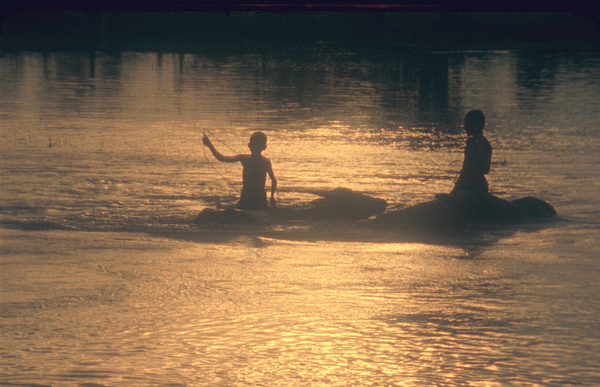|
Reviews of Recent Independent, Foreign, & Documentary Films in Theaters and DVD/Home Video

THE
BETRAYAL (NERAKHOON) When the Vietnam War expanded into the borders of Laos, Thavisouk’s father signed up to help the U.S. military identify targets for its extensive bombing campaign. But even with explanatory archival footage of the dirty little secret war providing historical context for how that country and its people became political pawns, the verdant landscape is always seen as beautiful and almost mythical, where ancient Laotian prophecies of killing and destruction came horrifically true. How the Phrasavath family becomes abandoned by the U.S., torn apart, subjected to deprivations, and amazingly reunited over many years would be an heroic enough tale, breathtakingly retraced in this film. Their miraculously escape to a refugee camp in Thailand and their struggle to get to America is only half of this complex reflection on exile in a country that wants to forget Vietnam, let alone its wartime allies. Two years after the Phrasavath family were unceremoniously dumped in 1982 next to a crack house in Brooklyn, 19-year-old Thavi heard about a student wanting Lao language lessons. His student, Ellen Kuras, is now an award-winning cinematographer, noted for years of distinctive work with such innovative directors as Ted Demme, Michel Gondry, Spike Lee, and Rebecca Miller. But that has just been her day job. Years into the project, Thavi’s insight and maturity developed, and he became an equal collaborator in the film’s writing and directing. He himself intimately filmed a surprising and emotionally wrought reunion. Though she isn’t seen or heard on screen, Kuras’s commitment to her long gestating first film was not just extraordinary as she continued to take a longitudinal look at the family’s difficult life here and their awkward adjustment. Her time and resourcefulness sometimes required shooting spur of the moment in Super 8, 16 millimeter, or various video formats that changed over the years, depending on what equipment was closer at hand as crises and opportunities occurred. She happened to grab a VHS video camera when a call came that the family was being threatened by a local gang, and she viscerally captures the confrontation and their immediate fear and anguish as a tiny minority community. In 1995, she smuggled a small Super 8mm camera into Laos when expatriates were first allowed to visit under close supervision, catching Thavi’s raw reactions at finding his grandmother and sisters. (Bring a hankie for these reunion scenes.) With the news of the difficulties
local translators and other essential assistants are facing in Iraq and
Afghanistan as they seek refuge in the U.S., this past
betrayal isn’t just a poignant portrait, but, unfortunately, a relevant
lesson. Nora Lee Mandel
|

